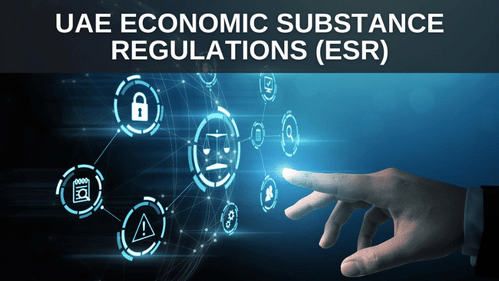
The UAE Economic Substance Regulations (ESR) are a set of regulations introduced to ensure that entities operating in the UAE demonstrate substantial economic activity within the country. These regulations were implemented to meet the requirements set by the Organisation for Economic Co-operation and Development (OECD) and the European Union (EU) aimed at combating harmful tax practices and preventing tax evasion.
Here’s a detailed description of the UAE Economic Substance Regulations:
Scope and Applicability: The ESR applies to all UAE onshore and free zone companies, including branches and subsidiaries of foreign entities, engaged in specific “Relevant Activities.” These activities typically include banking, insurance, fund management, leasing, headquarters, shipping, holding company, intellectual property, and distribution and service center businesses.
SSubstance Requirements: Under the ESR, relevant entities must demonstrate that they have adequate substance in the UAE, including:
Core Income-Generating Activities (CIGAs): Entities must conduct core income-generating activities relevant to their business activity within the UAE.
Employees and Physical Presence: Entities must have an adequate number of qualified employees, incur sufficient operating expenditures, and have physical assets and facilities in the UAE.
Control and Decision-Making: Entities must demonstrate that strategic decisions are made locally within the UAE and that the Board of Directors meets regularly.
Record Keeping: Entities must maintain accurate and comprehensive records of their activities and operations in the UAE.
Reporting Requirements: Relevant entities are required to submit an annual Economic Substance Report (ESR) to the relevant regulatory authority, typically within 12 months from the end of the financial year. The report should detail the entity’s activities, income, expenses, assets, employees, and other relevant information to demonstrate compliance with the substance requirements.
Regulatory Authorities: The regulatory authorities responsible for overseeing compliance with the ESR vary depending on the jurisdiction and the type of business activity. For mainland companies, the regulatory authority is typically the Ministry of Economy or the respective Department of Economic Development (DED), while free zone companies are regulated by the relevant free zone authority.
Penalties for Non-Compliance: Non-compliance with the ESR can result in penalties, including financial penalties, suspension, or revocation of business licenses, and other regulatory sanctions. It’s essential for entities to understand their obligations under the ESR and take necessary steps to ensure compliance.
Exemptions and Exceptions: Some entities may be exempt from the ESR or may qualify for exceptions based on specific criteria outlined in the regulations. For example, entities that are tax resident outside the UAE or are part of a group subject to tax regulations in another jurisdiction may be exempt from certain provisions of the ESR.
Impact on Business Operations: The ESR has implications for the operations, structuring, and tax planning strategies of businesses operating in the UAE. Entities may need to review their corporate structures, substance requirements, and compliance processes to ensure alignment with the regulations and avoid potential penalties or regulatory action.
International Cooperation: The UAE government has committed to international cooperation and exchange of information to ensure transparency and compliance with global standards for tax governance. This includes sharing relevant information with foreign tax authorities and participating in initiatives aimed at combating tax evasion and aggressive tax planning.
Overall, the UAE Economic Substance Regulations are aimed at promoting economic substance and transparency in the UAE’s business environment while ensuring compliance with international standards for tax governance. Businesses operating in the UAE must understand their obligations under the ESR and take appropriate measures to demonstrate substantial economic activity within the country.